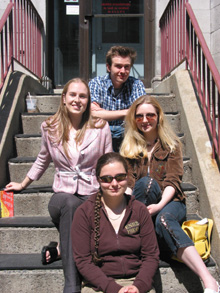
Science College graduates are keen to do their part

Photo by AJ Kelly
Louise Henault-Ethier (bottom of photo) is the winner of the Governor-General’s Silver Medal as the higest-achieving undergraduate of the year. She did honours biology, and had an almost perfect GPA.
A committed environmental advocate, she worked through the Sustainable Concordia Project to develop a large-scale composting project for the university, which she will use for her master’s in the Special Individualized Program (SIP).
She used skateboarding in a research project in Exercise Science, examining its long-term effects on posture and musculature. “I’ve been skateboarding for 13 years. It has allowed me to travel and meet interesting people while staying fit.”
Claire Barber (at left in photo) moved from Vancouver to study cell and molecular biology, and plans to study medicine.
“I seriously doubt I would have achieved half of what I have without the experiences I’ve had in the Science College,” she said.
As a strategic learning group leader with Counselling and Development, Claire organized student-led review sessions in physiology and worked as a biology and chemistry research assistant. She also found time to play field hockey.
“I try to stay as busy as possible. I’ve been involved in volunteer organizations with people whose lives have been touched by cancer, and participated in group outings with adults with special needs.”
Emily McDonald (in photo, at right) did honours degree in biochemistry with a minor in interdisciplinary studies.
“Studying in an environment where I have access to other students and teachers in disciplines outside my own was hugely beneficial,” she said. “The Science College is an environment where no scientific question is too charged to discuss.”
She chose Concordia because of its multicultural environment and because it “is governed by principles of equality.” From someone who spends her spare time volunteering with disabled children through a program at the YMCA, these principles represent words to live by.
“The Y program is teaching family, children and the general public about children with special needs and how they can most benefit in society and how society can be enriched by them.”
She intends to study medicine at McGill University. “Hopefully in five years I’ll be wandering the halls of a hospital, somewhere in the middle of a 36-hour shift, working on two hours of sleep.”
Philippe Papillon-Smith is graduating with a degree in cell and molecular biology, and will go into medicine at McGill.
The Science College’s interdisciplinary approach “allowed me to take a step out of my biology bubble and to view the world of science as a cohesive, interlocking whole composed of many parts.”
It also gave him an opportunity to be involved in important research outside his field. “I spent a summer studying object recognition memory in rats in Dr. Mumby’s lab at the Centre for Studies in Behavioural Neuroscience.”
Philippe plans to become a pediatrician, practicing in rural and impoverished areas of Quebec.
“Anyone with a conscience should do what they can to make the world a better place. For me, that means providing access to health care in places that struggle to maintain this basic right.”